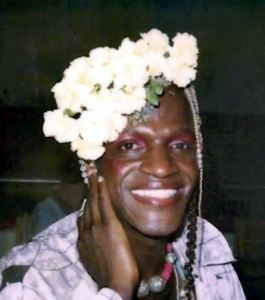
Marsha P. Johnson
*Marsha P. Johnson was born on this date in 1945. She was a Black LGBT liberation activist, entertainer, and self-identified drag queen.
Johnson was born Malcolm Michaels Jr. in Elizabeth, New Jersey. She had six siblings, and her father, Malcolm Michaels Sr., was an assembly line worker at General Motors, while her mother, Alberta Claiborne, was a housekeeper. Johnson attended an African Methodist Episcopal Church as a child and was a devout Christian throughout her life, often taking an interest in Catholicism and other faiths. Johnson first began wearing dresses at age five but stopped temporarily because she would get harassed by boys who lived near her house. Johnson's mother, who told her that being homosexual is like being "lower than a dog," was unaware of the LGBT community.
After Johnson graduated from Edison High School in Elizabeth, N.J., in 1963, she left her home for New York City with $15 and a bag of clothes. She waited on tables after moving to Greenwich Village in 1966. Johnson initially called herself "Black Marsha" but later decided on "Marsha P. Johnson" as her drag queen name, getting Johnson from the restaurant Howard Johnson's on 42nd Street. She said that the P stood for "pay it no mind." Johnson variably identified herself as gay, as a transvestite, and as a queen (referring to drag queen). She said her drag style was not serious (or "high drag") because she could not afford clothing from expensive stores. She received leftover flowers after sleeping under tables used for sorting flowers in the Flower District of Manhattan and was known for placing flowers in her hair. By 1966, Johnson lived on the streets and engaged in survival sex; she was arrested many times and shot once in the late-1970s. During that time, she also spoke of first having a mental breakdown. Johnson was tall, slender, and often dressed in flowing robes, shiny dresses, red plastic high heels, and bright wigs.
From 1972 through the 1990s, she sang and performed as a member of J. Camicias' international, NYC-based drag performance troupe, Hot Peaches, When The Cockettes, a similar drag troupe from San Francisco, formed an East Coast troupe, The Angels of Light, Johnson was also asked to perform with them. In 1973, she performed the role of "The Gypsy Queen" in the Angels' production "The Enchanted Miracle." In 1975, Johnson was photographed by artist Andy Warhol as part of a "Ladies and Gentlemen" series of Polaroids. Though generally "generous and warmhearted" under her Marsha persona, Johnson's dark side sometimes emerged, often resulting in her being hospitalized and sedated. This dual personality of Johnson has been a reason that gay activists had initially been reluctant to credit Johnson for helping to spark the gay liberation movement of the early 1970s due to her mental state.
As gender nonconforming and an outspoken advocate for gay rights, Marsha P. Johnson was one of the prominent figures in the Stonewall uprising of 1969. Through her sexual identity, she conveyed the intersectionality of African America. A founding member of the Gay Liberation Front, Johnson co-founded the gay and transvestite advocacy organization S.T.A.R. (Street Transvestite Action Revolutionaries) alongside close friend Sylvia Rivera. A popular figure in New York City's gay and art scene, Johnson modeled for Andy Warhol and performed onstage with the drag performance troupe Hot Peaches. Known for decades as a welcoming presence in the streets of Greenwich Village, Johnson was known as the "mayor of Christopher Street." In 1990, Johnson performed with The Hot Peaches in London, singing "Love" while wearing an ACT UP, "Silence = Death" button. At the time of her death, she was said to be increasingly sick and in a fragile state.
On July 6, 1992, shortly after the pride parade in New York, Johnson's body was discovered floating in the Hudson River. Police initially ruled the death a suicide, but Johnson's friends and other local community members insisted Johnson was not suicidal. They noted that the back of Johnson's head had a massive wound.